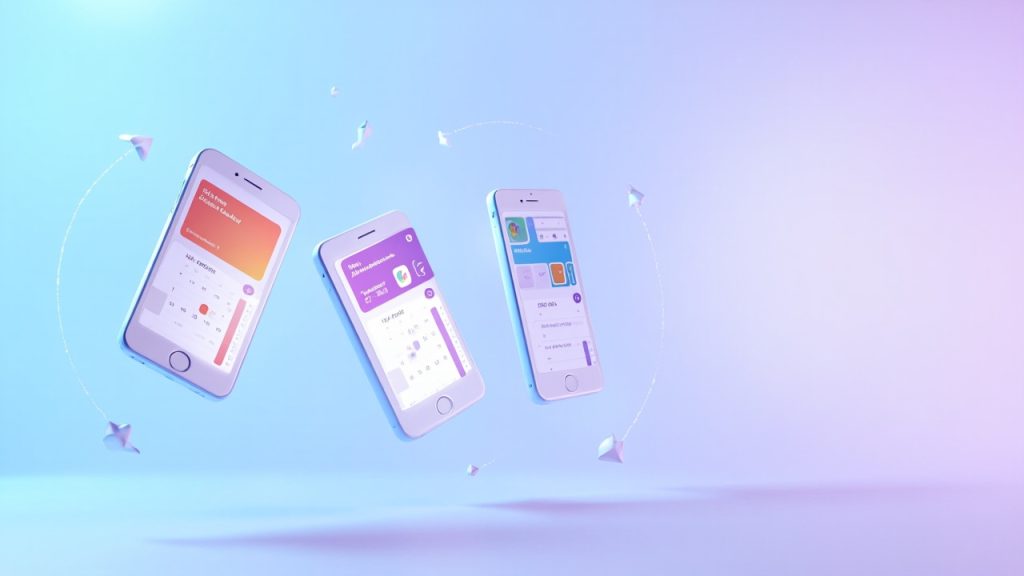In today’s fast-paced digital world, choosing the right calendar application can make the difference between staying organized and feeling overwhelmed. With countless options available, three standout contenders have captured the attention of professionals and personal users alike: Google Calendar, Microsoft Outlook, and Fantastical. This comprehensive calendar apps comparison examines these powerful scheduling tools across multiple dimensions, including user experience, pricing structures, cross-platform functionality, and advanced features. Whether you’re managing complex business schedules or organizing personal commitments, understanding the strengths and limitations of each platform will help you make an informed decision that aligns with your specific productivity needs and workflow requirements.
Calendar Apps Comparison: Overview of Google Calendar, Outlook, and Fantastical Features
Each of these leading calendar applications brings distinct advantages to the table, catering to different user preferences and organizational styles. Google Calendar stands out as the most accessible option, offering seamless integration with the broader Google Workspace ecosystem and providing robust sharing capabilities that excel in collaborative environments. Its smart scheduling features, including automatic event creation from Gmail and intelligent meeting suggestions, make it particularly appealing for users already invested in Google’s productivity suite.
Microsoft Outlook delivers a comprehensive solution that extends beyond basic calendar functionality, incorporating email management, task organization, and contact synchronization within a unified interface. The platform’s strength lies in its enterprise-grade features, including advanced meeting scheduling, resource booking capabilities, and sophisticated permission controls that make it ideal for large organizations and professional environments.
Fantastical distinguishes itself through exceptional design aesthetics and innovative natural language processing capabilities. Users can create events simply by typing phrases like “dinner with Sarah tomorrow at 7 PM,” and the application intelligently parses this information into properly formatted calendar entries. This premium option focuses on user experience refinement and offers unique visualization options that appeal to design-conscious professionals and creative individuals.
User Interface and Design: Which Calendar App Offers the Best Experience
The user interface design philosophy varies significantly across these three platforms, with each targeting different user preferences and workflow styles. Google Calendar adopts a clean, minimalist approach that prioritizes functionality over visual flourishes. Its color-coding system allows users to organize different calendar categories effectively, while the quick event creation feature enables rapid scheduling without complex navigation sequences.
Microsoft Outlook presents a more traditional, business-oriented interface that integrates calendar functionality within a comprehensive productivity dashboard. The application’s ribbon interface provides extensive customization options and quick access to advanced features, though some users find this approach overwhelming for simple scheduling tasks. The recent design updates have modernized the visual appearance while maintaining the familiar layout that enterprise users expect.
Fantastical excels in visual design sophistication, offering multiple viewing options including a unique DayTicker feature that provides an innovative timeline perspective. The application’s attention to typography, spacing, and visual hierarchy creates an aesthetically pleasing experience that reduces cognitive load during daily planning activities. Its natural language input field represents a significant departure from traditional form-based event creation, making it particularly appealing for users who prefer conversational interaction methods.
Pricing and Value: Comparing Calendar Apps for Different Budgets
Budget considerations play a crucial role in calendar app selection, with each platform offering different value propositions across various pricing tiers. Google Calendar provides exceptional value through its completely free tier, which includes unlimited calendar creation, event scheduling, sharing capabilities, and integration with other Google services. For users requiring advanced features, Google Workspace plans start at $6 per user per month, providing additional storage, enhanced security features, and administrative controls.
Microsoft Outlook follows a subscription-based model through Microsoft 365, with personal plans beginning at $6.99 per month and business plans starting at $6 per user per month. While this represents a higher entry cost compared to Google’s free offering, the subscription includes access to the complete Office suite, premium email features, and advanced calendar functionality that many professional users find justifiable.
Fantastical positions itself as a premium solution with subscription pricing starting at $4.75 per month for individual users and $7.50 per month for family plans. This pricing structure reflects the application’s focus on design excellence and specialized features rather than mass-market accessibility. For users who prioritize aesthetic appeal and innovative interaction methods, the premium price point often proves worthwhile, particularly when considering the time savings achieved through improved user experience.
Cross-Platform Compatibility and Synchronization Capabilities
Modern professionals require calendar applications that function seamlessly across multiple devices and operating systems, making cross-platform compatibility a critical evaluation criterion. Google Calendar excels in this area through its web-based foundation and robust mobile applications for both iOS and Android platforms. The synchronization happens in real-time across all devices, ensuring that schedule changes are immediately reflected regardless of the access point used.
Microsoft Outlook provides comprehensive cross-platform support through native applications for Windows, macOS, iOS, and Android, plus web access through Outlook on the web. The synchronization capabilities extend beyond calendar data to include emails, contacts, and tasks, creating a unified experience across all devices. However, some users report occasional synchronization delays, particularly when switching between different device types or operating systems.
Fantastical offers excellent synchronization through iCloud, Exchange, Google, and other calendar services, though its platform availability is more limited compared to competitors. The application provides native experiences on macOS and iOS, with recent expansion to Windows platforms. The synchronization quality is exceptional within supported ecosystems, but users requiring Android compatibility may find limitations that affect their workflow integration needs.
Advanced Features That Set These Calendar Apps Apart
Advanced functionality distinguishes professional-grade calendar applications from basic scheduling tools, with each platform offering unique capabilities that cater to specific user requirements. Google Calendar incorporates intelligent features such as automatic event creation from Gmail messages, smart meeting room suggestions based on attendee locations, and integration with Google Meet for seamless video conferencing setup. The application also provides working hours customization, multiple timezone support, and collaborative scheduling through shared calendars.
Microsoft Outlook delivers enterprise-focused advanced features including room and resource booking, scheduling assistant for finding optimal meeting times, and sophisticated delegation capabilities that allow assistants to manage executive calendars. The platform’s integration with Microsoft Teams, SharePoint, and other Microsoft 365 services creates powerful workflow automation opportunities that benefit large organizations.
Fantastical focuses on user experience innovations such as natural language event creation, weather integration, and unique visualization modes like the DayTicker timeline view. The application’s parser can understand complex scheduling requests and automatically populate appropriate fields, while its calendar sets feature allows users to quickly toggle between different viewing contexts for work, personal, and project-specific schedules. These productivity-focused enhancements often prove valuable for users seeking to minimize time spent on calendar management tasks, similar to how Notion can streamline productivity workflows through intelligent organization systems.
Calendar Apps Comparison for Business vs Personal Use
The distinction between business and personal calendar requirements significantly impacts application selection, with each platform demonstrating varying strengths across these use cases. Google Calendar serves both contexts effectively through its flexible sharing controls and integration capabilities. Business users benefit from Google Workspace’s administrative features, while personal users appreciate the application’s simplicity and seamless integration with consumer Google services like Google Photos for event documentation.
Microsoft Outlook clearly targets business environments through its comprehensive enterprise features, though it remains capable for personal use. The application’s strength in meeting coordination, resource management, and corporate compliance makes it particularly valuable for organizations requiring sophisticated scheduling capabilities. Personal users may find the interface overwhelming, but those already using Microsoft 365 for other purposes often appreciate the integrated experience.
Fantastical appeals to both business and personal users who prioritize design quality and user experience efficiency. Creative professionals and executives often find value in the application’s aesthetic appeal and time-saving features, while its calendar sets functionality helps maintain clear boundaries between professional and personal scheduling. The premium positioning makes it particularly attractive to users who view calendar management as a critical productivity investment.
Integration Capabilities with Third-Party Tools and Services
Integration ecosystem strength often determines long-term calendar application satisfaction, as users increasingly rely on interconnected productivity tools for comprehensive workflow management. Google Calendar offers extensive third-party integration through its robust API and widespread adoption by developers. Popular integrations include Slack for meeting notifications, Zapier for workflow automation, and numerous project management tools that sync deadlines and milestones directly to calendar views.
Microsoft Outlook provides deep integration within the Microsoft ecosystem and supports numerous third-party applications through Microsoft’s app marketplace. Business users particularly benefit from integrations with Salesforce, Adobe Creative Suite, and various CRM platforms that enable seamless scheduling coordination with customer relationship management workflows. These integrations often prove essential for organizations already invested in Microsoft’s productivity ecosystem, much like how comprehensive project management software requires robust integration capabilities to maximize effectiveness.
Fantastical supports integration with major calendar services including iCloud, Exchange, Google, and CalDAV-compatible platforms, though its third-party ecosystem is more limited compared to competitors. The application focuses on quality over quantity in its integration approach, ensuring that supported connections work reliably and maintain the user experience standards that define the platform. Users seeking extensive automation capabilities may find limitations, but those prioritizing core calendar functionality with select integrations often find this approach refreshing.
Performance, Reliability, and User Satisfaction Analysis
Performance characteristics and reliability metrics significantly impact daily user experience, particularly for professionals who depend on accurate scheduling for business operations. Google Calendar demonstrates excellent reliability through Google’s robust infrastructure, with minimal downtime reported and consistent synchronization performance across devices. User satisfaction surveys consistently rank Google Calendar highly for reliability and ease of use, though some users report limitations in advanced customization options.
Microsoft Outlook generally provides strong performance within enterprise environments, though some users experience occasional synchronization delays or interface responsiveness issues, particularly when managing large volumes of email and calendar data simultaneously. The application’s reliability has improved significantly with recent updates, and enterprise support options provide reassurance for business-critical deployments. User satisfaction varies considerably based on organizational implementation quality and individual familiarity with Microsoft’s interface paradigms.
Fantastical receives consistently high user satisfaction ratings for design quality and innovative features, though its smaller user base means fewer comprehensive reliability studies are available. The application’s performance is generally excellent on supported platforms, with particular praise for its responsive interface and reliable synchronization capabilities. Users who invest in Fantastical’s premium pricing typically report high satisfaction levels, suggesting that the application successfully delivers on its value proposition for its target audience.
Selecting the optimal calendar application requires careful consideration of your specific needs, budget constraints, and existing technology ecosystem. Google Calendar emerges as the best choice for users seeking reliable, free functionality with excellent collaboration features and broad integration support. Microsoft Outlook proves ideal for business environments requiring comprehensive enterprise features and deep Microsoft 365 integration. Fantastical represents the premium option for users who prioritize design excellence and innovative user experience features. This calendar apps comparison demonstrates that each platform serves distinct user segments effectively, making the choice dependent on individual priorities rather than objective superiority. Consider testing each application’s free trial or basic version to determine which interface and feature set align best with your productivity workflow and scheduling requirements.



